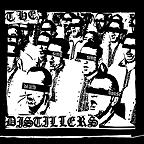The Distillers' Sing Sing Death House is one of the few albums in the mainstream eye that truly deserves to be referenced as "punk-rock". It is nasty and contemptuous, provocative and empowering and flies by at a breakneck pace. Unlike most modern-day fare that attempts to disguise itself under the tattered blanket of punk-rock, the members of The Distillers, vocalist/guitarist Brody Armstrong, drummer Andy Outbreak, bassist Ryan and former guitarist Rose/Casper, are living the life and are steeped in its spirit. Far too often these days artists that, though they may have been spurred by the form's power in their formative years, have done a great disservice to the name of punk-rock. Through ironing out all of the genre's beautiful wrinkles and cleansing it free of any bothersome stains, they have helped dilute the power of the very music that vitalized and impassioned them in their nascent existences. Thankfully, there is still a thriving underground scene and one where the best of the best is represented by the always credible, Los Angeles-based Epitaph Records (its founder/owner, Brett Gurewitz of Bad Religion, serves as one of this album's mixers and engineers) and the album's label, Epitaph offshoot, Hellcat Records.
Leading a twelve-song stampede, Armstrong is a woman with enough requisite piss and kerosene to ignite a dozen lesser bands. With a voice that is confident, strong and well worn for someone so young (she's only 23), she inflects song after song with passion and purpose. From the autobiographical out-of-the-pits-of-hell "The Young Crazed Peeling", to the women's rights ode of "Seneca Falls" (wherein Armstrong name checks such women's liberty pioneers as Susan B. Anthony and Elizabeth Cady) and the powerfully riveting "City Of Angels", which makes all of the talk comparing Armstrong's voice to the magnificent Courtney Love's all that much harder to shake. It is bizarre how often Armstrong's voice begs for the likening to Love. In interviews, Armstrong downplays the comparisons and tries to assert her true influences (from The Plasmatics' late singer Wendy O. Williams, to Siouxsie Sioux to Debbie Harry), but even if she was not influenced by Love, the equating of the two is still sound.
The possibility of "City Of Angels" becoming a punk anthem is very strong. It's chorus of "They say this is / the City of Angels / All I see is dead wings", is indellible in its spirit and infectious in its delivery. Armstrong's authoritative vocal delivery is matched pound for pound by the band's muscular venting. Armstrong's description of her past bouts with drugs on "I Understand" in the form of "I was a mis-shape, mistake, misfit / Untamed mis-hap, with a junkie heart" gives some insight on the type of dredging of her soul that is displayed on this album. Armstrong lays her soul to bare for all to see with further brazen honesty on "The Young Crazed Peeling". In the song, Armstrong describes her growing up in Melbourne, Australia. "My mum kicked my dad out for battery / Found a way, she found a way out of spiritual penury", words that reveal a lack of pretense on her upbringing and in their exposure of raw nerves.
As enthusiastic and straight-edged as "Sing Sing Death House" is, and for all of Armstrong's brave struggling with her emotional horrors, the album lacks a certain zeal to carry it beyond its spiritual leanings. The sense that they are capable of moving forward and making an album that could be a real watershed recording is clear. This album feels more like a stepping stone to greater things, though. Right now they have made one of the more honest and vital punk-rock records of recent memory, one of which deserves every ounce of love it has gotten.
